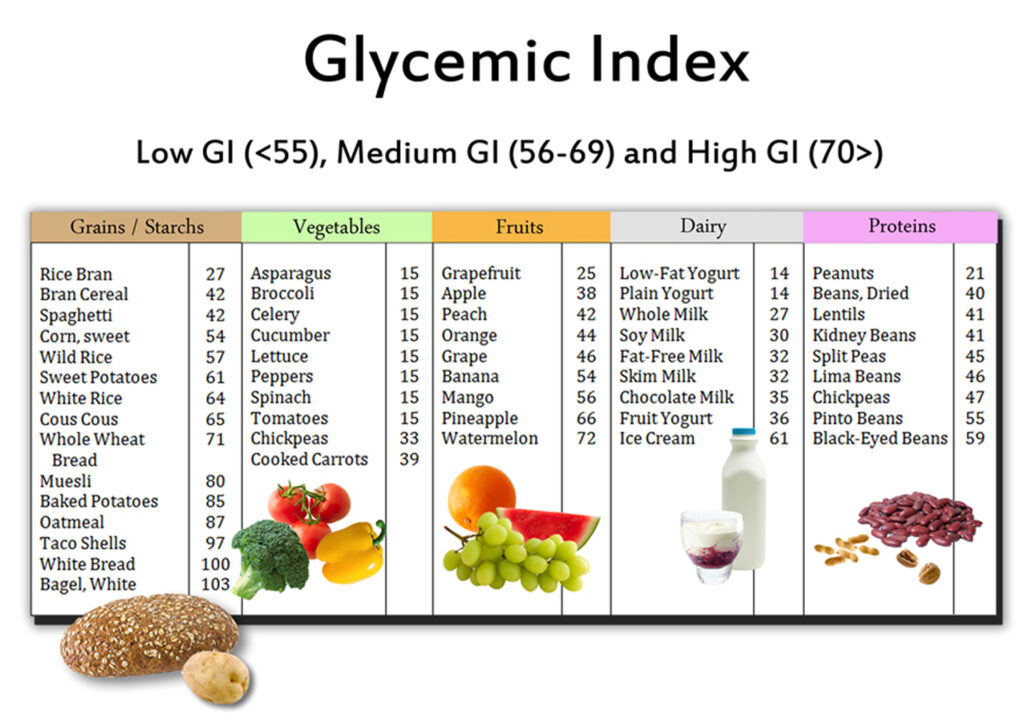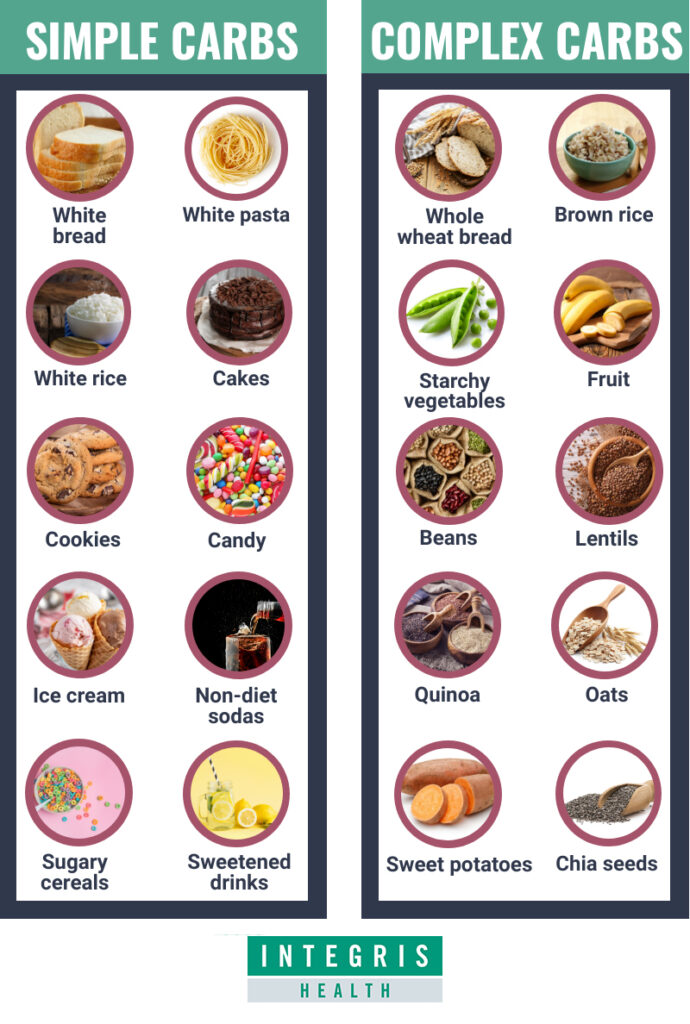Over the last several decades we have seen an increase in consumption of processed and sugary foods. As a result of this, there has been a steady increase in the rates of diabetes and prediabetes over the last several years. Understanding and controlling blood sugar levels is crucial for everyone, not just those with diabetes or prediabetes. Stable blood sugar levels can help keep your energy steady, maintain a stable mood, and promote an overall healthy lifestyle. In this article, we will explore the top 10 ways to best control your blood sugar.
1. Understand the Glycemic Index
The Glycemic Index (GI) is a critical tool that measures how much specific foods raise blood sugar levels. Foods are ranked on a scale from 0 to 100, with lower scores indicating a lesser impact on blood sugar spikes. A score of less than 55 is generally considered a low glycemic index. Integrating more low-GI foods like whole grains, legumes, and non-starchy vegetables can lead to more stable blood sugar levels. It’s not just about avoiding sugar; it’s about understanding how different types of carbohydrates affect your body.
For example, a ripe banana has a higher GI than an unripe one. Additionally, the way food is cooked and processed can affect its GI. Al dente pasta, for instance, has a lower GI than overcooked pasta. Learning to choose and prepare foods based on their glycemic impact can go a long way to helping you control your blood sugar.

2. Fiber Intake
Fiber slows the absorption of sugar and helps improve blood sugar levels. Aim for a mix of soluble and insoluble fiber from various sources like fruits, vegetables, whole grains, and legumes. An apple a day doesn’t just keep the doctor away; it keeps the sugar spikes at bay!
Soluble fiber, found in foods like oats, nuts, and seeds, is particularly effective in stabilizing blood glucose levels. It forms a gel-like substance in the gut, which slows down digestion. This slower digestion means that sugar is released and absorbed more gradually into the bloodstream.
Moreover, a high-fiber diet can contribute to feelings of fullness, helping to curb overeating and assist in weight management. This is vital for blood sugar control. By making fiber-rich foods a staple in your diet, you’re not only supporting your blood sugar levels but also contributing to your overall gut health and well-being.
3. Understanding Carbohydrates
Carbohydrates, when consumed, are broken down into glucose during the digestive process. Glucose is then absorbed into the bloodstream, leading to an increase in blood sugar levels. This is generally why those with diabetes are advised to avoid carbohydrates. However, controlling your blood sugar doesn’t necessarily mean you also have to cut out carbohydrates. You just have to understand how to choose the right carbs to consume.
Simple carbs, like those found in sugary snacks and drinks, can cause quick spikes in blood sugar. In contrast, complex carbs, found in foods like whole grains and legumes, are absorbed more slowly and provide more stable energy. When choosing carbohydrates, it’s best to choose foods with complex carbs to help control your blood sugar.
It’s also essential to combine carbohydrates with other nutrients, such as proteins and healthy fats, to further regulate blood sugar levels. A meal with a good balance of these nutrients will not only keep your blood sugar levels more stable but will also keep you satisfied and full for a longer period. This can prevent overeating and help in weight management, which is another crucial aspect of controlling blood sugar.

4. The Power of Protein
Having a good protein source at each meal can help slow the absorption of carbohydrates and sugar, keeping you fuller for longer and your blood sugar steady. Lean meats, fish, dairy, and plant-based proteins like lentils and chickpeas are excellent choices.
It’s essential to consider the quality of the protein as well; opt for grass-fed, organic, or wild-caught options when possible. Not only does protein aid in blood sugar regulation, but it also plays a critical role in repairing tissues and building muscle.
For vegetarians or those looking to reduce meat intake, quinoa, tofu, and tempeh are fantastic alternatives, providing both protein and a variety of other nutrients beneficial for overall health. Incorporating a diverse range of proteins in your diet ensures a broader spectrum of nutrients, contributing to better health and effective blood sugar control.
5. Exercise Regularly
Regular physical activity is a cornerstone of blood sugar management. It helps your body use insulin more efficiently, which can lower your blood sugar levels. Aim for a mix of cardio, strength training, and flexibility exercises. Consistency is key here – even a brisk walk daily can make a significant difference.
However, it’s not just about the type of exercise, but also the timing. Exercising after meals, for example, can be particularly effective in controlling post-meal blood sugar spikes. Even a short 10-15 minute walk after eating can have a noticeable impact.
Additionally, variety in your exercise routine can prevent boredom and keep you motivated. Try different activities like swimming, cycling, or group fitness classes to keep things interesting. Remember, the best exercise is the one you enjoy and can stick to in the long run. By integrating regular physical activity into your life, you’re not just managing your blood sugar levels but also improving your overall health and well-being.
6. Monitor Your Blood Sugar
Keeping track of your blood sugar levels using a glucometer is more than a routine; it’s a window into understanding how your body reacts to different stimuli. Regular monitoring can help you see the immediate effects of dietary choices, physical activity, and even emotional states on your blood sugar levels. This insight is invaluable in tailoring a personal approach to blood sugar management.
For those with diabetes, frequent monitoring is essential for managing the condition and preventing complications. However, even if you don’t have diabetes, understanding your body’s responses can help you make more informed choices. For instance, you might notice that certain foods cause a significant spike in blood sugar levels, which can be an indicator to moderate or avoid these foods.
Moreover, tracking your blood sugar can be empowering. It provides tangible evidence of how your lifestyle changes are paying off. Seeing the direct impact of a healthy diet, regular exercise, and stress management on your blood sugar readings can be incredibly motivating. It’s not just about numbers; it’s about gaining control over your health and seeing real progress.
7. Hydration is Key
Water isn’t just a thirst quencher; it’s a vital tool in managing your blood sugar. Opt for water or unsweetened beverages over sugary drinks like sodas or sweetened teas, which can cause rapid increases in blood sugar levels.
Moreover, understanding your body’s signals is crucial. Sometimes, what we interpret as hunger can actually be signs of dehydration. By staying hydrated, you can avoid unnecessary snacking, which can contribute to blood sugar fluctuations.
In essence, make water your go-to drink. Carry a water bottle with you throughout the day to remind yourself to drink regularly. By prioritizing hydration, you’re taking a simple yet powerful step in managing your blood sugar and enhancing your overall health.
8. Stress Less
Stress is a natural part of life, but chronic stress can wreak havoc on your blood sugar levels. When you’re stressed, your body releases stress hormones like cortisol and adrenaline, which can cause your blood sugar to rise.
To combat this, consider incorporating stress-reduction techniques into your daily routine. Deep breathing exercises, such as diaphragmatic breathing, can help calm your nervous system and lower stress hormone levels. Yoga and meditation are also excellent choices for reducing stress and promoting relaxation.
In addition to these practices, finding healthy outlets for stress, such as engaging in hobbies you enjoy or spending quality time with loved ones, can provide emotional support and alleviate stressors.
Remember that managing stress is not only beneficial for your blood sugar but also for your overall well-being. By reducing stress in your life, you’re taking a significant step toward better blood sugar control and improved health.
9. Get Quality Sleep
Quality sleep is not just about the quantity of hours you spend in bed; it’s about the restorative power of those hours. When you consistently experience restful slumber, your body can perform essential maintenance and repair functions, including blood sugar regulation. During deep sleep, your body fine-tunes its hormone balance, including insulin, which plays a central role in regulating blood sugar levels. Sleep deprivation can disrupt this delicate balance, leading to insulin resistance and higher blood sugar levels.
By prioritizing quality sleep, you not only support better blood sugar control but also enhance your overall well-being. You’ll wake up feeling more refreshed, energized, and better equipped to tackle the day ahead.
10. Medication and Regular Check-ups
While lifestyle modifications are the cornerstone of blood sugar management, some individuals may require medications to achieve optimal control. It’s essential to work closely with our office to determine the right treatment plan for your specific needs.
Medications for blood sugar control can vary widely, from oral medications that help your body use insulin more effectively to injectable insulin itself. Your healthcare provider will consider factors such as your blood sugar levels, overall health, and personal preferences when recommending a treatment regimen.
Regular check-ups are vital to monitor your progress and make necessary adjustments to your treatment plan. During these appointments, your healthcare provider will review your blood sugar levels, discuss any challenges or concerns you may have encountered, and provide guidance on optimizing your management strategies.
Additionally, these appointments are an opportunity to assess your overall health and screen for any potential complications related to diabetes or blood sugar imbalances. Catching and addressing issues early can help prevent more severe complications down the road.
Remember that your healthcare provider is your partner in managing your blood sugar effectively. Be open and honest about your experiences, and don’t hesitate to ask questions or seek clarification on any aspect of your treatment plan. With the right combination of lifestyle changes, medication, and regular check-ups, you can achieve and maintain stable blood sugar levels, promoting your long-term health and well-being.
Bottomline
Controlling blood sugar is a journey unique to each individual, but the destination is the same: a healthier, more vibrant life. Start by implementing these ten steps, monitor your progress, and adjust as needed. Remember, small, consistent changes can lead to significant results. Take charge of your health today and enjoy the sweet, balanced life you deserve!
Dr. Sergio Guiteau is a physician who is board-certified in Family Practice and Sports Medicine with added certifications in Aesthetic Medicine. He specializes in Preventive Medicine, Sports Medicine, and Anti-Aging Medicine and blogs on Advancedrejuv.com/blog

